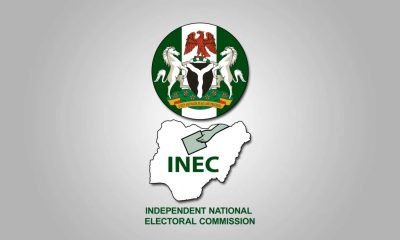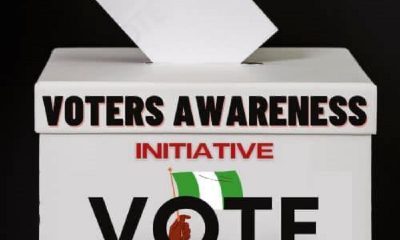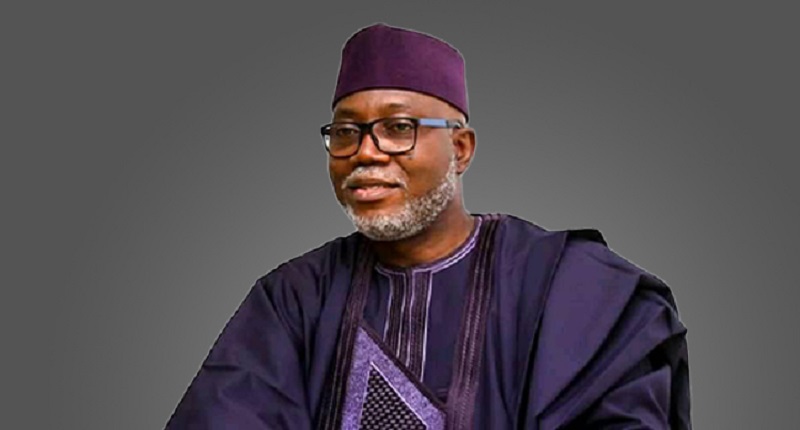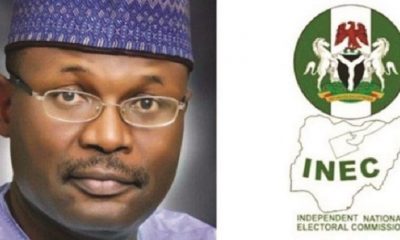General
Why We Can’t Create Electoral Constituencies Now—INEC
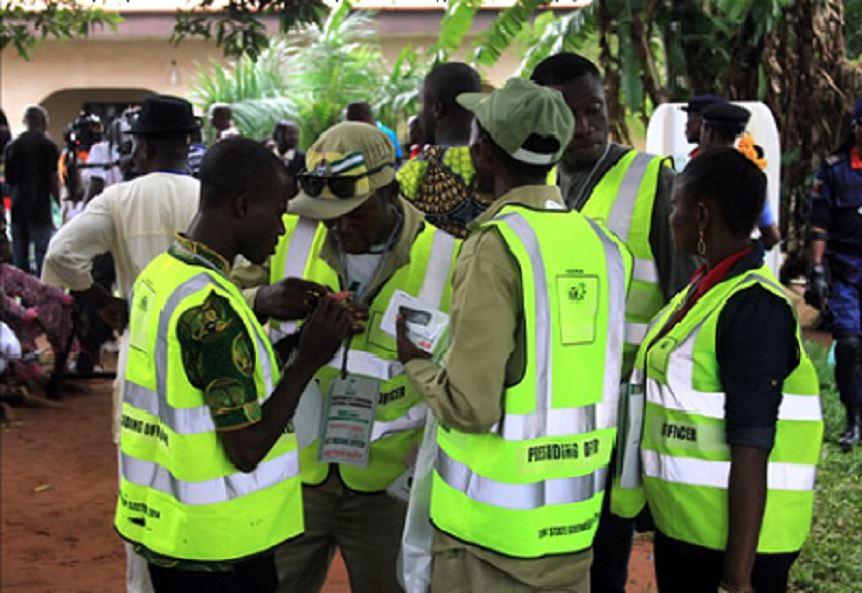
By Ahmed Rahma
The Independent National Electoral Commission (INEC) on Friday explained its inability to create new electoral constituencies.
The explanation was given in a statement issued in Abuja by the National Commissioner and Chairman of its Information and Voter Education Committee, Mr Festus Okoye.
The electoral umpire, which said it was responding to recent reports regarding its responsibilities in the division, revision and adjustment of electoral constituency boundaries in Nigeria, noted that while the division of the country into electoral constituencies for Senate, House of Representatives and State Houses of Assembly was its responsibility, once they are established, subsequent revision of the constituencies and/or adjustment of their boundaries are the joint responsibilities of the agency and the National Assembly.
According to Mr Okoye, any such revision or adjustment must be passed by a resolution of the two houses of the National Assembly, namely the Senate and the House of Representatives.
He said, “As a result, the commission has been in discussion with the relevant committees of the National Assembly to arrange a meeting with the leadership of the Assembly to address some of the difficult issues in the division, revision and alteration of electoral constituency boundaries in Nigeria.
“Some of these issues, which the commission had previously brought to the attention of the National Assembly, include the following: ‘The 1999 Constitution (as amended) does not place an obligation on INEC to revise or alter the boundaries of constituencies every 10 years, as has been canvassed by some opinions in the media. For the avoidance of doubt, Section 73 (1) of the Constitution provides for that to happen at intervals of ‘not less than 10 years.’
“This implies that it can only happen from 10 years and above. Therefore, the commission is not in breach of the Constitution, since the revision could happen in 10 years or more.
“The Constitution also provides that the commission may embark on revision and adjustment after a national census, creation of States or by an Act of the National Assembly [Section 73 (2)].
“None of these conditions actually exists at the moment. The last population census was conducted in 2006, about 15 years ago. The commission feels that revising and/or altering constituencies based on 15-year-old population data is inappropriate because the well-known rapidity of population changes in Nigeria would make nonsense of any outcome.
“In any case, the National Population Commission (NPC) is working on conducting another census and it seems reasonable to await its outcome.
“On the other hand, no new states have been created in Nigeria since the Constitution came into effect in 1999 nor is there an Act of the National Assembly requesting INEC to activate the relevant sections of the Constitution on division, revision and alteration of electoral constituencies.
“On the state constituencies to be created in each state of the federation, the Constitution provides that the number for each state should be three or four times the number of its federal constituencies (seats in the House of Representatives), subject to a minimum of 24 and a maximum of 40.
“The problem is that some states presently have three times the number of their seats in the House of Representatives, others have four times; others have the minimum of 24 and yet others have reached the maximum of 40.
“For some, their present number of State Assembly constituencies is neither three nor four times the number of their House of Representative seats. This motley distribution calls for more clarity in the division, revision and alteration of electoral constituency boundaries, which in fact may require constitutional amendments.
“There is also the question of the so-called suppressed constituencies. Essentially, these are constituencies that existed prior to the coming into force of the 1999 Constitution. The canvassers for these constituencies argue that they have been “suppressed” in the present dispensation.
“Forty-two cases were filed in various courts across the country requesting INEC to be compelled to ‘restore’ 62 constituencies. The Commission has consistently argued that the idea of ‘restoration of a constituency’ is both legally questionable and practically improbable.
“It is questionable to ask INEC to restore constituencies that existed under an old constitutional order in the present one. For example, the present Constitution provides for the maximum seats in the House of Representatives and the multiples of that for State House of Assembly constituencies. Restoring all old constituencies from a different constitutional order would definitely mean that the number set by the present Constitution may be exceeded.
“Besides, there have been many previous constitutional orders, each with its own specification of limits on the number of constituencies. Furthermore, which of the old constitutional provision should we restore? Perhaps, some people may even ask for the restoration of the four constituencies in Calabar and Lagos created in 1922 following the Clifford Constitution.
“Also, it is a misnomer to talk of suppressed constituencies because some of the constituencies have been divided territorially as a result of state creation and boundary adjustments, creation of Local Government Areas, as well as the creation of the subsisting electoral constituencies.”
Mr Okoye further noted that while some of the court judgments in the cases on these so-called suppressed constituencies have agreed with the position of the commission, others have gone for the “suppressed constituency” canvassers and that in yet other cases, the commission has appealed the judgments.
“These are some of the challenges that have constrained the commission on the question of revision and adjustment of electoral constituencies.
“Yet, the commission is not oblivious of the importance of balanced constituency delimitation on the democratic and electoral processes. However, these are complicated legal, political and practical issues.
“This is why the commission has requested for a meeting with the leadership of the National Assembly to resolve these issues and build the necessary consensus that will ensure that any revision of electoral boundaries will be passed by the National Assembly, unlike in the past when the Commission’s proposals on revision and alteration of electoral constituencies received no response from the Assembly.
“The commission is presently preparing a comprehensive discussion paper on these issues to assist in its engagement with the National Assembly.
“The commission wishes to put on record the frank and open discussions with the leadership of several committees of the National Assembly and their support on these issues and also appeals for public support to ensure that the right atmosphere exists for the commission to continue to do its work in this regard.
“For emphasis, the Commission also wishes to state that the issue of electoral constituencies is separate and distinct from the ongoing consultation on voter access to polling units in Nigeria”, he added.
General
NIMASA Rallies Stakeholders’ to Develop National Action Plan

By Adedapo Adesanya
The Nigerian Maritime Administration and Safety Agency (NIMASA) has pledged its commitment to provide the regulatory leadership, technical coordination, and stakeholder engagement required to successfully develop and implement a robust National Action Plan on maritime decarbonization in Nigeria.
The Director General of the agency, Mr Dayo Mobereola, made this known during the National Stakeholders’ workshop on the development of a National Maritime Decarbonization Action Plan, further describing the workshop as a critical step in actualising the Federal Government’s blue economy and climate objectives.
Represented by the Executive Director, Operations, Mr Fatai Taiye Adeyemi, the NIMASA DG underscored the significance of the IMO GreenVoyage2050 Project, a technical cooperation initiative /designed to support developing countries in implementing the IMO GHG Strategy.
According to him, the National Action Plan being developed will reflect national realities, leverage existing capacities, address identified gaps, and align with broader economic and environmental priorities of the federal government.
Mr Mobereola stressed that “this transition is not merely about compliance with international obligations, it is about safeguarding our marine environment, protecting public health, strengthening the blue economy, and ensuring that our maritime industry remains competitive and future-ready”, the DG said.
Also speaking at the event was the Technical Manager of the IMO GreenVoyage2050 Project, Ms Astrid Dispert, who highlighted that the overarching objective of the initiative is to advance a coherent and globally aligned regulatory framework to accelerate maritime decarbonization.
She also emphasised that NIMASA plays a pivotal role in driving the project at the national level.
The IMO GreenVoyage2050 Project provides technical expertise and institutional support to assist countries in developing and implementing National Action Plans that promote sustainable shipping practices, encourage investment in clean technologies, and strengthen capacity for long-term emissions reduction.
Through this collaboration, the federal government is advancing deliberate steps towards maritime decarbonization, reinforcing its commitment to global climate goals and ensuring a cleaner, greener, and more sustainable future for the sector.
General
BPP Mandates Digital Submission for MDAs From March 1

By Adedapo Adesanya
The Bureau of Public Procurement (BPP) has directed all Ministries, Departments and Agencies (MDAs) to comply with its digital submission process effective March 1.
The directive was contained in a circular signed by the Director-General of the Bureau, Mr Adebowale Adedokun, noting that the move was part of the bureau’s commitment to digital transformation and paperless governance.
It explained that the transition followed an earlier circular of Aug. 4, 2025, which introduced electronic submission procedures.
According to the bureau, it has successfully moved from physical filings to a dedicated e-mail service for document submissions and is now advancing to a more robust and integrated system.
The circular announced the inauguration of the BPP Digital Submission Portal, a web-based platform designed to enable MDAs submit procurement-related documents directly to the Bureau.
It stated that the automated platform would streamline the submission process, enhance transparency and ensure accelerated tracking of procurement-related documents and petitions.
“With effect from March 1, all MDAs will be required to use the portal to submit requests for ‘No Objection’ Certificates, approvals for ‘No Objection’ for special procurements, clarifications and status updates on submissions,” the bureau said.
It added that the portal would be hosted on the Bureau’s official website and would become fully operational from the effective date.
The bureau warned that physical submissions or manual hand-deliveries would no longer be prioritised and would eventually be rejected following the full transition to the digital platform.
It urged accounting officers to brief their procurement departments and ICT units on the development to ensure seamless processing of procurement activities from March 1.
It further advised MDAs to contact the Bureau via its official email for information on the onboarding process and integration into the portal.
The bureau emphasised that full compliance by all MDAs was required to ensure a smooth transition and avoid delays in the implementation of the 2026 fiscal year procurement processes.
General
Senate Seeks Removal of CAC Boss Hussaini Magaji
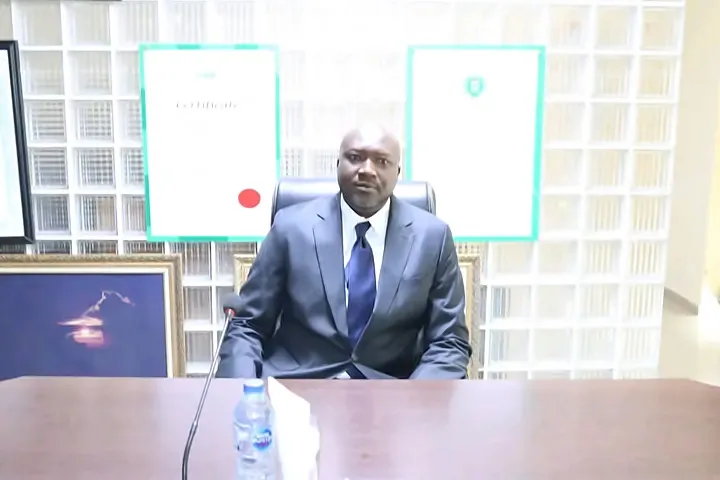
By Adedapo Adesanya
The Senate has asked President Bola Tinubu to remove the Registrar General of the Corporate Affairs Commission (CAC), Mr Hussaini Ishaq Magaji, from office.
The Senate Committee on Finance, while passing a resolution in Abuja on Thursday, accused Mr Magaji, a Senior Advocate of Nigeria (SAN), of failing to honour the Senate’s invitations to account for the finances of his agency.
“He refused on so many occasions to honour our invitation to appear before this committee.
“We have issues with the reconciliation of the revenue of CAC.
“Each time we invite him, he gives us excuses,” the Chairman of the committee, Mr Sani Musa, said as the committee passed the resolution.
CAC was part of a group of agencies that the House of Representatives Public Accounts Committee (PAC) recommended zero allocation for the year 2026, for allegedly failing to account for public funds appropriated to them.
The committee, at an investigative hearing held two weeks ago, accused CAC and some other ministries, departments and agencies (MDAs) of shunning invitations to respond to audit queries contained in the Auditor-General for the Federation’s annual reports for 2020, 2021 and 2022.
The PAC chairman, Mr Bamidele Salam, stated that the National Assembly should not continue to appropriate public funds to institutions that disregard accountability mechanisms, saying this will create fiscal discipline and strengthen transparency across federal institutions and conform with extant financial regulations and the oversight powers of the parliament.
“Public funds are held in trust for the Nigerian people. Any agency that fails to account for previous allocations, refuses to submit audited accounts, or ignores legislative summons cannot, in good conscience, expect fresh budgetary provisions. Accountability is not optional; it is a constitutional obligation,” he said.
-

 Feature/OPED6 years ago
Feature/OPED6 years agoDavos was Different this year
-
Travel/Tourism10 years ago
Lagos Seals Western Lodge Hotel In Ikorodu
-

 Showbiz3 years ago
Showbiz3 years agoEstranged Lover Releases Videos of Empress Njamah Bathing
-

 Banking8 years ago
Banking8 years agoSort Codes of GTBank Branches in Nigeria
-

 Economy3 years ago
Economy3 years agoSubsidy Removal: CNG at N130 Per Litre Cheaper Than Petrol—IPMAN
-

 Banking3 years ago
Banking3 years agoSort Codes of UBA Branches in Nigeria
-

 Banking3 years ago
Banking3 years agoFirst Bank Announces Planned Downtime
-

 Sports3 years ago
Sports3 years agoHighest Paid Nigerian Footballer – How Much Do Nigerian Footballers Earn


